#DIRECTLY WOULD ADD TO ARTHURS PROMISED DESTINY
Text
ok so . ok. ok . SO
this was a very good episode but i am likeeeeeeee.
(put a cut cause it ended up being a Rant lol)
what is the Point of the Destinies and Prophecies in the show even? i have been spoiled for the ending years ago so, seeing the dragon and gaius and even merlin seriously considering letting mordred die and arthur of all people finding a way to help him was such a powerful story! like the scene of him breaking him out and delivering him to the druids! i kinda got chills!
but bc I Know How It Ends i feel very. Hm:/ cause see, mordreds whole schtick post 'mordred is evil now' like post 1400s (in arthurian myth) was that he was arthurs fateful punishment. arthur is told one of his bastard sons will kill him and he decided to kill every infant befora that can happen. mordred barely escapes and resolves to kill arthur because of his violence (and yknow there tons of stories like that in ancient myths, some variations have arthur just abandoning him, but thats the gist)
but here....... arthur does everything right? he goes above and beyond, setting out to save mordred himself. merlin, who hears the prophecy, does the opposite of what "og" myth king arthur does and resolves to have compassion and mercy instead of giving in to violence and fear. so it seemed that the show was breaking apart from the 'you cant escape your fate' line of myth, but as it turns out they wont, and i guess its snagging on my brain because:
1- it doesnt work so well here because arthur didnt hear the prophecy. it kind of defeats the purpose of a self fulfilling prophecy if he never knows about the prophecy in the first place
2- there isnt that much of a grayness here. mordred is not arthurs son, is a magical kid from a peaceful people and would suffer a terrible fate against arthurs wishes anyway. they did the right thing in a pretty black and white situation
3- because the show, lbr, doesnt have medieval or ancient sensibilites, and they have this magical oppression core that mordred was involved in, and arthur is supposed according to this show help end this opression, the idea that destiny will punish him for helping a magical kid at great risk to himself, for morgana no less feels really.............. pointlessly mean? emphasis on the pointless.
like truly. what is the fateful punishment here. arthur will die by mordreds hands after helping him despite the fact hes the magichate town prince, because merlin didnt listen to the prophecy but LIKE. WHAT IS THE TAKEAWAY HERE??
kill innocent children over fate? (which is, again THE OPPOSITE of what mordreds most famous myth was getting at) idk, always listen to prejudice?? bc not helping mordred would be allowing uther to kill one more innocent magical being, and Fate wanted the king who was promised to end magical oppression to do that because.............................................................. ?? ?? ?????
Now. granted, i might know merlin's ending but i dont know the middle, so theres probably something there that arthur will do and will tie into his fate, but. because this is so specifically framed as 'if you let the boy live, you'll never fullfil your destiny' here, it doesnt matter yknow? its still narrative punishment for them making all the right choices. i dont get it
#damn it i told myself not to get attached sos to not be disappointed#but this accidentally fired me up#HOW ARE U GONNA HAVE ARTHUR AND MERLIN and morgana i suppose#FLIPPING A PROPHECY ON ITS HEAD NOT JUST FOR GOOD BUT IN A WAY THAT#DIRECTLY WOULD ADD TO ARTHURS PROMISED DESTINY#AND THEN PUNISH THEM FOR IT#ANYWAYD FJGDKok#also this is probably riddled with errors its a bit of a rant ks#merlin blogging#THE BEGGINING OF THE END#INDEED#BUT THAT END SOUNDS DUMB
0 notes
Text
Destiny and What It Meant for Merlin’s Relationships (IN MY OPINION!!!):
aka A Discussion about Merthur that Very Quickly Devolved
[disclaimer: god lets fucking hope third times the charm.. anyways, i saw something that made me defensive over merthur bc it kept comparing them to other relationships merlins had and using destiny to downplay them, and that led to this. so i bring up merthur a lot. this talks about destiny in merlin’s relationships, and then relates them back to merthur. this doesn’t attack any ships, i promise! it’s literally just me drawing up comparisons where destiny is concerned and then it starts talking more about destiny’s role in feelings, so. 5.3kish it keeps getting longer wtf word count up ahead… very incoherent… i may have gone a little insane. read at own risk] (also, endless amounts of thanks to @queer-clotpole and @once-and-future-dawn for finding that link &also for sending this back to me after tumblr deleted it….u guys r literally the bestests)
okay, one of my biggest pet peeves is the insinuation that merlin only really cared about arthur/loved him (in whatever way) because of destiny. ive already written about this here on someone elses post, but i also just wanted to add another few points: if that were true, literally all of merlin’s character digression in season 5 would make absolutely no sense???
if nothing else, season 5 showed how much merlin started prioritizing arthur over and despite destiny. he literally!!! went completely against any plan of action - even/especially regarding legalizing magic - in order to save arthur. thats what makes season five (and consequently the entire show) so hard to watch!!! because if only merlin had cared a little less about arthur/if he’d played into destiny a little more and followed it, then magic would’ve been legalized and arthur probably wouldn’t have died!!! if merlin only loved arthur because of destiny, then how could he have disregarded destiny so thoroughly for him? yeah, destiny brought them together, but it didn’t bring them any closer. as i said in the other rant: merlin’s destiny was to help arthur unite albion/bring magic back to the land (“without you, Emrys, Arthur cannot build a new world we all long for.” 5.10). he didn’t have to care about arthur? he only had to care about 1)helping him unlearn his hatred for magic, and 2) making sure he survived long enough to do something about that change of heart. merlin had several chances to do this, and yet forwent all of them because there was a possibility that arthur - his friend, not his destiny - would die. (i think we all are thinking the same thing, here: 5.05 in That One Heartwrenching Scene).
another thing: by reducing merlin/arthurs bond (however you want to think of it) to a mere product of destiny, one would also imply that destiny was only in play with arthur and merlin/that they were the only ones who had destinies or were involved in a particular destiny, which just wouldn’t be true at all?? let me explain: im going to take four people merlin was very close to and use them as examples, aside from arthur (also, please note that if you ship him with any of these people, im in no way trying to attack that!!! i love merlin with a lot of them, im not discrediting them! actually im saying why this particular argument doesnt work against any ship because it applies to all of them):
Lancelot: lancelot was foretold to be in merlin/arthurs lives, as heard by kilgharrah in 4.02, making him part of merlin’s destiny. see: “sir lancelot, the bravest and most noble of them all.” …see also in 4.02 at the isle of the blessed: it wasn’t arthur’s time to die, but it also wasn’t merlin’s. this left lancelot (or gwaine) to sacrifice themselves in order to save camelot (since that was the original goal) which needed to be done in order for the golden age to come, this directly links him to merlin/arthurs destiny. (“your time among men is not yet over, Emrys.” *looks pointedly at Lance, about to walk through the veil, almost as if she knew this was gonna happen*). what i’m trying to say is: someone was going to die that night so that albion would have a future. destiny ensured that it was neither arthur nor merlin by virtue of needing them later for their own destinies. it also wasn’t gwaine. by law of elimination, if destiny called for a single person to die, and took away ¾ of the choices, then it’s a fair assumption to say that lancelot was almost ‘destined’ to die there, no? you could argue that any other knight could’ve gone, but then - destiny is like, the master of putting the exact person it needs in the exact place it needs them in. also - lancelot was the only one who knew what merlin was planning on doing. If any other knight had gone, merlin would have sacrificed himself, and we already know destiny can’t have that. [so, by logic of reducing merlin/arthur’s relationship to only a product of destiny and nothing more, you’d also have to reduce Lancelot’s sacrifice and loyalty/love for merlin here to destiny, too, which is just grossly unfair.]
Gwaine: gwaine was also foretold to be in their lives, as heard in 3.08. see: “courage, magic, and strength.” - arthur needed gwaine there in order to complete ‘one of the most important’ tasks in a prince’s life; the ultimate deciding factor of whether they’re fit to be a king or not. now, you can debate the merits of how much it actually would’ve affected arthur’s ascension to the throne, since he was the only recognized heir, but the way they amp it up was: you die or you complete it, and if you do neither of those things then no one will actually think of you as a worthy king. arthurs destiny of being ‘the once and future king’ would’ve thus taken a huge blow. he needed to prove himself, otherwise what good is a king no one thinks is worthy? what good is a king dead before he even becomes one? so, merlin and him needed gwaine there in order to 1) help arthur with his destiny of becoming a respected king n uniting albion and 2) help merlin’s destiny of not only helping arthur become king, but also of helping arthur save albion (“…for this is not arthur’s quest, but yours.” 3.08)/bring magic back. hence courage and magic not only needing each other, but also needing strength. this makes them all a part of each others destiny. [so since gwaine was destined to be in merlin and arthurs lives as much as they were meant to be in each others^, does that mean you have to disregard his loyalty and love for merlin (+arthur later on) with the previous logic of merlin&arthurs relationship not being as authentic ~bc of destiny~?]
Freya: once again, also in merlin’s life as a product of destiny. see: 3.08 with the bit about the fisher king (“…water from the lake of avalon. I have kept it safe these years waiting for the right person to claim it, and that is you. for you are the chosen […] albions time of need is near. […] your powers are great, but you will need help”) , and then cut to 3.12 when merlin sees her spirit is in the water and she gives merlin the sword. her interference is literally the only thing that ensured their victory over the immortal army, once again making sure that camelot actually has a future for the “uniting albion” bit to take place. this, again, makes her a direct player in all this destiny business. so she, too, was destined to be in merlin’s life - does that also reduce their bond in 2.09 to something that they had no choice over?
Elyan: who was also foretold (i think this also implies the rest of the knights being part of the destiny as well). see: “heed my words with due concern, for one of you will not return.” in 5.06, The Dark Tower episode. I think the mere fact that Elyan’s death was known shows that he was part of the destiny. you might also be able to say that this might not have been specifically Elyan but rather just any one of the knights. thats why i think this is an indicator that all the knights were part of the destiny, too. (idk why the fuck he had to die - but his life of being a knight [+all the others’] in arthur and gwen and merlin’s camelot was, still, a foretold part of merlin and arthur and gwens destinies. does that reduce their found family? their brotherhood?).
we always say how “arthur was merlin’s destiny”, but he wasn’t. helping arthur was, and that is not the same thing, because the first one implies that no one else was part of merlin’s destiny. which, as i try to explain with the above four examples, is just not true; they all had a role in merlin’s destiny. they were all ‘foretold’ just as arthur had been. they are not separate from destiny; they’re not an escape or an exception, they’re a part of a whole.
furthermore, there’s:
That One Old Guy in 3.05. see: “the moment of our meeting has been written for many, many years”
That Other Guy About To Die in 5.01. see: “i have been haunted by this moment for many years. since long before you set foot on this earth, Emrys.”
Finna in 5.10. see: “it is my destiny, Emrys, to serve you until the end.”
they didn’t even play a huge role in merlin’s life, and yet their destinies still put them in his path because they were intertwined. everyone that merlin met who contributed to his destiny was part of his destiny. whoever was there, was meant to be there.
my point with the above is: destiny is not an independent or singular event, particular to a very small set of people. in my opinion, the big destiny is albions future, and then everyone else has their own roles in bringing it about. it’s like, a destiny containing a subset of other destinies that will eventually fully complete it. yes, some people had a more relevant role in the grand scheme of things and were more closely intertwined than others, but they were all linked together. merlin’s destiny didn’t revolve around gwaine, lancelot, elyan, freya, or really anyone else, but it did incorporate them significantly - they were still a part of merlin’s and albion’s destiny, just as he was a part of theirs. ^merlin still needed each of those people at one point of his life in order to complete his destiny/get it to a specific point, just like he needed arthur and gwen and mordred and finna and literally anyone else. this means that no one role is more or less significant. (taylor swift asked it best: ‘if one thing had been different, would everything be different?’ to which this show implies, repeatedly, that the answer is yes. so many things could go differently if any one instance went differently, so they’re all equally important^. that’s why they were put in merlin’s path (but that’s not why they stayed). think of this: if gwaine hadn’t been there on merlin/arthur’s quest in 3.08, they wouldn’t have been able to complete it (“that’ll be--” “your friends, courage and strength, I know. without their help, you would not be here” 3.08), and camelot would’ve been doomed. think of all those little decisions merlin made that directly led to arthur’s downfall, if one of those things didn’t happen, would arthur have died? could arthur have been saved? aithusa is one example i never stop thinking about - what if merlin hadn’t named her? what if kilgharrah had looked after her? what if merlin didnt try to save her life in 5.01 by telling her to go?)
so all that being said, how can you reduce one relationship as ‘against what they would’ve wanted without destiny’ without doing the exact same thing to all the other relationships? destiny’s role in all the other ones was equally important, so…?
and i guess one argument that comes to mind straight away is that there’s an inverse relationship between the relevancy of one’s role in a destiny and the authenticity of their choices: the more central the role, the less their choices are really choices, because the more destiny needs to control them. in terms of actions*, all i can say is: destiny is probably going to dictate someone’s actions if they venture too far away to complete the destiny (because i do think there’s flexibility within its confines), but in terms of relationships, i think i can make an argument. here’s the thing: i really, genuinely believe that there is no possible way your destiny can make you feel an emotion. “but, nextstopparis, later on near the end of this, don’t you literally talk about how overwhelmed and trapped merlin felt because of destiny??” yes, reader, you’re right. but in my opinion, that wasn’t destiny’s fault. that was the way some figures in merlin’s life (*cough* kilgharrah *cough*) chose to present destiny. do you really think merlin would’ve felt so trapped and overwhelmed if the news was broken just a little bit gentler? If so much significance wasn’t put on it when he was being told? if he didn’t know at all? i don’t think so. he doesn’t feel trapped in his destiny because he has one, he feels trapped because he was told he has one.
ok, now back to my original point: i don’t think destiny can make you feel an emotion. you might tell me that the more two peoples’ destinies are intertwined, the bigger role they have in each others lives, and thus more exposure to each other which would equal more of a chance that they’ll get close. and that, you could argue, would be a direct manipulation and not very much of a “real connection”, but i ask you: do you really think that’s possible? just because you spend more time with someone (willingly or not) will you automatically grow fond of them? i think that if you don’t get along with someone, you just. dont get along with them. if anything, being that close all the time might make you dislike them/hate them even more? so, if destiny can’t force you to get along with people^ and consider them as friends, then merlin was just as likely to devote himself to arthur/love arthur without destiny as with it, right? this also applies to his relationships with literally everyone else. merlin got along with them. he chose to keep them around as friends. but…“nextstopparis, maybe since he knew about his and arthurs intertwined destinies, he felt obligated.” obligated? to? be his friend…? why would he feel obligated into caring about him, when at most his destiny asks him to save arthur a lot? i can understand merlin feeling responsible for arthurs life because of the knowledge. but? feeling obligated to care for him??? to love him??
actually, that’s a good point. let’s try and hypothesize what would’ve happened if merlin didn’t know about his destiny with arthur, thus there being no chance of having this sense of obligation to love him to see if their relationship would’ve changed:
merlin would’ve still been at the feast/banquet because gaius took him
he would’ve still saved arthurs life - since thats just a human decency thing??
ewther would still have made him arthurs manservant
they would’ve ended up in literally the exact same position as in the first episode.
now, what about the argument of “ok, he might’ve still gotten the job, but since he felt no obligation brought on by the knowledge of the destiny, he wouldn’t have stayed.” which i will say, is very plausible. i don’t believe this though (for a few reasons), because literally on his third/fourth day, he tells gaius he’s enjoying the job (“is it my imagination, or are you beginning to enjoy yourself?” *scoffs defensively* “i-it isn’t totally horrible all the time” 1.02… mm ok bby downplay it all u want). not to mention, in that same episode he gets fired. he gets fired and it hurts his feelings and he wants his job back (that smile when arthur says ‘im rehiring you’ - you know the one). it’s not a desperate sort of need that would come with obligation, it’s just something he wants. he just… likes working for arthur. this happening is independent of his knowledge of destiny (he hates it at first anyways, then slowly grows to enjoy it. also: he didn’t even rlly care about destiny at this point, so all of his decisions are of his own volition), so we can safely assume that this same thing would’ve happened without the knowledge of his destiny. so, continuing:
him and arthur would’ve still started bonding
he would’ve stayed in his job*
they would’ve still gotten as close as they did - just maybe without merlin’s pep-talks of “i believe in your destiny” before battles since he didn’t know about destiny
so now you’re thinking “but didn’t you also say that one difference *cough* in this case, merlin not knowing destiny *cough* leads to everything else being different, too? except…the way you’re talking makes it seem like nothing would be that different if merlin hadn’t known??” yes! yes i did say that, reader, and here’s the thing: i think that if merlin didn’t know about the destiny, everything important to the destiny would be different. think about it: as one example, he wouldn’t have been so suspicious of mordred all the time. and he wouldn’t have been so adamant on killing mordred to save arthur. since that was the thing that sealed arthur’s fate (5.05), id say it was a pretty important event to destiny, thus it makes sense that it would have changed. i just don’t think how merlin’s relationship with people progressed mattered to destiny at all. if they were there, that’s all that mattered. it didn’t matter why or how they were there, just that they were. thats why (i think, using what little logic I have to draw up hypothetical events,) it seems that merlin’s relationship with arthur wouldn’t have changed - because they could’ve been at a professional distance the whole time and completed the destiny. they could’ve complimented each other all the time and completed the destiny. it didn’t matter how they viewed or treated or cared for one another, as long as they got things done. their relationship wasn’t ultimately important, so with the difference of merlin not knowing his destiny, it wouldn’t have been affected at all (at least, not much/drastically). this reiterates the point im trying to make about their relationship being just as authentic as the next one.
[*now, let’s talk about this post, because destiny might not care about people’s relationships, but it cares a lot about people being in the right place (see: lancelot) at the right time. you can use this to say: “so what if destiny did make merlin love arthur with some, like, voodoo shit? because it needed him to stay close to arthur, and making him love arthur is the surest way to do that, right?” well, reader, let’s see. this is one part where the post comes in because it talks about how merlin - in the earlier seasons - did anything/ tried to take every possible escape from his destiny as he could, and how he really was not all that reserved about leaving it behind, giving examples from the lady of the lake, the witchfinder, the moment of truth etc. (please go read it - it’s so so so so good). so then, if destiny did make merlin fond of arthur to get him to stay…it backfired pretty fucking horribly? if merlin was made to care about arthur the way he did just to stay close to him…...why did he want/try to leave several times, then? so now you might be thinking “ok, nextstopparis, i’ll grant you the fact that he wasn’t forced to care about arthur here, but what if his repeated attempts to escape then lead to destiny forcing him to care?” well, honestly? the only thing i can think to say to you is: then why would destiny even bother? i think we can all agree here that destiny isn’t capable of caring about anything but itself, so if it had the power to make sure everything went by without a hitch, why wouldn’t it just exercise that power from the beginning? why risk waiting until something threatening happens to make sure it won’t happen again? it’s not like it’s a dictator trying to prove it’s “nOt tHaT baD!1!!1″? furthermore, it’s not like merlin would have known either way for destiny to even want to hide its power from him?? what could possibly be the point in waiting and risking everything, before making sure nothing goes wrong?? i think the real divide here comes with how much power you afford to destiny. i genuinely do not think destiny has power over people, just over events. it is, after all, itself just a major event waiting to happen, no? therefore, it seems impossible to me that merlin (or anyone else) could be made into feeling a certain way. this, i don’t think is either provable or disprovable? (but correct me if im wrong!!!). so anyways, all that being said, we can therefore, (mostly) safely conclude that destiny didn’t make anyone love anyone. (also: there you have it with the ‘obligation had nothing to do with how much he cared’ because he didn’t have a sense of obligation (“at least not yet” - which he later developed in s5, but by then he already cared for arthur enough to make it - in terms of their relationship - insignificant)).
so, anyways, the gist of the post is about how it wasn’t ooc of merlin to want to run away with freya, because he just really wanted an out from how trapped he felt with destiny. you should really go read it yourself, but it talks about how merlin’s primary motivation in the earlier seasons was to be loved - no obligation to destiny, no obligation to arthur. (i agree so hard with this). now you’re probably thinking, “then why’d you assume that merlin would stay in his job if he didn’t know? he might’ve liked it at first, but now you just said that he was trying to leave it even when he did know. wouldn’t leaving be easier to do, not knowing destiny? doesn’t that then mean arthur and merlin wouldn’t have grown so close, since he’d be able to leave, meaning their relationship would be different. and if it’s different in this case, then it is important to destiny, right? and since it’s important to destiny, it could’ve very well been fabricated.” but would it be easier to leave, reader? i did say he was trying to leave the job and that their relationship wasn’t ultimately important in the grand scheme of things and that destiny couldn’t make them feel a certain way, but i also said that destiny cares a hell of a lot about people being where they are supposed to be, and having the power to change events.
consider: in 1.10, merlin offers to stay in ealdor when speaking with hunith at the end of it. this is a direct instance of merlin wanting to leave his destiny, but ultimately not doing so. perhaps if he did not know about destiny, he would’ve fought his mom harder - perhaps he would’ve stayed in ealdor for longer. but just because we are pretending that he doesn’t know about destiny, does not mean destiny isn’t at play. do you really think that the same destiny that had a hand in killing freya to stop merlin from leaving camelot (this isn’t canon but it might as well be, ok?), would’ve allowed merlin to stay in ealdor? destiny might not care how merlin and arthur felt about each other (not that it would’ve been able to do anything about it, anyway) but it did care (and could control) that - at least geographically - they were near enough to get their destinies done. so, no. merlin wouldn’t have left his job - he may’ve wanted to, but i don’t think he would’ve been able to, whether he knew about destiny or not.
so now, i ask you again, because i’m pretty sure i know what you’re thinking: knowing his destiny or not, does merlin and arthurs forced proximity automatically lead to their love for each other? do you have to love everyone you spend a portion of your life with? someone who you might believe you’re supposed to love? [it’s not exactly the same thing, but think toxic friends. maybe you do worship them while stuck in the friendship, but upon leaving it, that all changes, right? so let’s say this was a case of merlin only loving arthur because he thought he had to (even though we already explained away any ‘obligation’ arguments). merlin had… 1500 years… to reach the point of “i didn’t love him, i was forced into thinking i did”. and yet? 1500+ years and he’s still pining?? he probably met so many amazing people during that time, and had so many amazing experiences (aus where merlin is happy before arthur comes back>>>), but he still missed arthur and waited for him, because that relationship was fucking special and real.] is love so trivial that the simplest manipulation can imitate it so thoroughly?
you might be thinking “nextstopparis, that’s horrible! how is destiny not letting merlin leave arthur any better?” it’s not. it’s fucked up and it sucks ass and it’s probably the most unfair thing about destiny. but that’s not the point of this post. the point isn’t to defend destiny, it’s to explain it. the point of this post is to tell you - yes, this sucks and yes, it’s horrible but it’s also not isolated. remember how everyone in merlin’s life was meant to be there? that means that everyone in his life would’ve been affected the same way. this is not just an issue with arthur/merlin, this is an issue with everyone ever. merlin loved everyone in his life just because he loved them. but no matter who they were, he wouldn’t have been able to leave them before it was ‘time’ - there was never more choice in that department with any one relationship. destiny didn’t force one relationship to progress, and then leave all the others alone, because it had equal sway in everything that was a part of it.
so now that we’ve established that there was nothing bonding merlin and arthur together other than themselves/their compatibility, let’s talk about destiny’s hand in freya’s death. hell, let’s talk about arthurs, and hope to drive the point home. merlin could have responded so differently to freya’s death by arthurs hand. he could’ve been so angry and cold and distant. it would have been so easy to just. stop responding and to emotionally distance himself from arthur at this point - i mean, he had every reason. the post i mentioned also talks about how arthur’s ‘1 step forward/2 steps back’ tango with his relationship with magic hurt merlin over and over. - how much it repeatedly let merlin down. every string keeping him with arthur was worn so thin - his one immediate/definite chance of happiness was gone, he fully believed he’d never be accepted for who he was, arthur had (unknowingly) betrayed him again, arthur had let him down again, destiny still wasn’t worth everything, destiny felt too far away - that he had every reason to just..shut off from arthur completely. and yet... he didn’t. whatever my opinions are on freya/merlin, in the show it’s obviously meant to be canon that they felt very strongly (idk about love) about each other. so to lose her because of arthur and yet still to forgive him? to be betrayed like that by arthur (knowingly or not), and yet to not hold it against him? (this actually reminds me of that doctor who quote: “do you think i care for you so little that betraying me would make a difference?”) to see, with his own eyes, that destiny seems to be failing and yet still believe in arthur and stay with him? is that really an emotion so insignificant that it can be falsified this meticulously?]
that got a little long, but now you might be back to thinking “ok, fine, nextstopparis, now say we’re assuming you’re right, and that merlin not knowing about his destiny/not feeling trapped because of it would’ve still resulted in as strong a bond for merlin/arthur as with the knowledge. that doesn’t change the fact that it was still an omnipresent force bringing them together in the background, so i still think it’s was never a real choice for merlin and arthur to be together.” to which i reraise my previous opinions of, ok reader, yes, but also - 1)their physical proximity had no correlation to the intensity of their relationship(as we’ve already talked about in great detail), so what does that matter, and 2)that logic is also then true for everyone in merlin’s life, because every single person in merlin’s life, just like arthur, was also part of that destiny. therefore, the exact same logic applies, which then means that no one relationship began “more authentically” or “more as a choice” compared to the others.
It wasn’t “arthur for merlin because destiny made sure it was no one else” it was “arthur for merlin because merlin chose to have arthur as more than a destiny.”
to summarize: i think every single person in merlins life was there because of destiny. yes, it sucks that he sometimes felt trapped and yes it was completely unfair how overwhelmed he was all the time, but that in no way reduces the authenticity of any of his relationships with people. they were put in his life to help him with something, but he chose how they fit there. destiny was brought up too much with too much emphasis on its importance which is what made it all so overwhelming for merlin, but…honestly? im starting to believe more and more that destiny is more of just. a push in a direction you wanted to go in, anyways. this is why i believe that ‘this show is the epitome of the quote “i do believe in fate and destiny, but i also believe that we are only fated to do the things we would choose, anyway.” by Kiersten White.’ this is also why i believe thinking destiny is anything else within the context of the show would make it a lot more depressing.
so please. PLEASE! stop reducing merlin’s relationships to an unfortunate effect of destiny. give him the respect of acknowledging that at the very least he was able to choose who he loved.
I also want to say that this post is only to show that merlin and arthur’s relationship/love for one another (platonic or otherwise) was just as valid and just as beautiful and just as real as merlin/arthur’s relationships with everyone else. it was just as untouched by destiny. you can debate the merits of “better ships” all you want, but i just don’t think destiny is an argument you can use in those debates (u know, common factor and all), unless im missing something?
anyways, idk if this makes sense or if this is even an actual argument, but i see a lot of people play the destiny card negatively for one thing but then completely ignore the fact that it applies to literally everything else, too, so i just needed to write this. it might be wrong on every level and a bit incoherent and also i repeat myself a lot but. i literally only have 0.03% more of a braincell than arthur so you literally cannot judge me. this is also completely just my opinion/thoughts and is thus very susceptible to errors of a gigantic size. so. i might be (probably am) missing a lot of important points. especially considering how biased/defensive i am where merthur is concerned jdiosjeoiejfsekl. omg
if you read this far: i am SO sorry, oh my god. do you still have brain cells?? they may have died with each word here…. n e ways idk if anyone will read this - im hoping to GOD not, but if you do and want to criticize my entire existence…fair… but pls b gentle abt it im sensitive. i tried to think of as many counterarguments as I could.
ok, thx 4 reading!
#this better fucking work#im so annoyed#i dont even have anything to say my head is completely empty#which probably means that this is all complete bullshit#hey if ur reading this I hope u enjoyed it took a lot out of me sjiejsefoisj#imagine... all that soul crushing and I get 1 note and its MYSELF lmao#bbc merlin#merlin#arthur pendragon#merthur#destiny#merlin meta#merthur meta#VERY LONG#sorry if there r spelling mistakes
130 notes
·
View notes
Note
What is your opinion on Rhaegars sexuality? It seems he was closer to men than to women, with his friendship to Arthur Dayne, and others he squired with. The two women Rhaegar has had sex with both seem to be out of “duty”; duty to create heirs, and complete the prophecy. Rhaegar seems uninterested in the women high and lowborn who adore him and Ned does not believe Rhaegar to be the type to visit brothels. Could Rhaegar be homosexual, or even uninterested in sexuality at all?
I don’t think Rhaegar was gay or bisexual, based on the evidence we have right now. GRRM is not against portraying gay or bisexual characters in either the main narrative of ASOIAF or on the historical side (I forgot a few in that list, admittedly, but it gives you a general sense), but when he does so, it’s usually pretty clear that he’s doing so (even if not always quite as expansive as Renly and Loras). We don’t hear of Rhaegar “preferring the company” of a single man or multiple men (the euphemism employed about both Laenor Velaryon and Aegon V’s son Daeron) or being devastated by the loss of a probable lover (like Laenor was over Joffrey Lonmouth, or poor Alf of Runnymudd over Garth Greyfeather) or being very reluctant to wed (like that same Prince Daeron or the definitely gay Jon Connington), there’s certainly no mention or hint of Rhaegar bedding men, either for his own preference or in addition to women (as was stated for Oberyn Martell and Hother Umber) or having “boy” lovers (like Lyn Corbray), and Rhaegar has not had such outrageously unsubtle hints dropped such that there’s really no other explanation (like Daemon II Blackfyre in “The Mystery Knight”). Indeed, toward Jon Connington (who was himself definitely in love with Rhaegar during the latter’s lifetime), the crown prince displayed at best feelings of distant friendship.
With respect to Rhaegar’s companions, I don’t see the same intimacy between Rhaegar and his court and, say, Laenor Velaryon and the “handsome squires” with whom he surrounded himself. Certainly, Rhaegar did have a court on Dragonstone, but in TWOIAF its members are spoken about in as and in the context of political supporters, rather than romantic partners. Barristan describes Rhaegar’s relationship with them more personally - Myles Mooton and Richard Lonmouth being “his close companions” after received their knighthoods, Jon Connington being “dear to the prince”, Arthur Dayne being his “closest friend” - but again, those relationships are easily believable, in large part at least, as Rhaegar looking for allies who would eagerly support the heir over the king. What I believe Rhaegar was really looking for in his potential friends was someone who could understand the terrible burden he felt as the prince that was promised (or so he believed for a while); Arthur Dayne probably could, but few others likely had the dynastic and mystical credentials to do so. Of course, given the patriarchal and often misogynistic attitude of Westerosi culture, it’s perhaps not surprising as well that Rhaegar might not have thought of women first as people who could empathize with his prophetic destiny; Aemon himself admits that “[n]o one ever looked for a girl” when it came to the prince that was promised, and I wouldn’t be surprised if that included Rhaegar too (since he seems to have transferred his identification of the prophesied prince from himself directly to his son).
I think that Rhaegar was not capable of loving anyone. To add to that, I don’t think Rhaegar was likely really interested in sex for the sake of sex. If he believed that some mixture of himself and/or his children were to be the “three heads of the dragon” that would save the world from coming doom, then I could see an argument that Rhaegar would have looked at the act of procreation as he did much else in his life - a reminder of the burden of prophecy on him, an act which he would complete “ably” and dutifully but without great joy or enthusiasm.
51 notes
·
View notes
Text
Scale of Dragon, Tooth of Wolf: ASOIAF and the Wars of the Roses
The hardest thing about writing this meta was literally, where to begin? I will apologize in advance, as I will try to keep my thoughts as tidy and streamlined as possible, but I have a lot to cover and do tend to run away with my words at times. This is a collaborative meta of sorts, as I drew insight, inspiration and help in constructing this massive baby from the wonderful @thewesterwoman (who also contributed parts of it, as noted within).
So, I suppose we’ll start where I begun. A few weeks ago, I stumbled onto this meta about Jamie Lannister and how he may actually be TPTWP. Now, before you shrug that off, I suggest you read this:
https://thewesterwoman.tumblr.com/post/163650220053/azor-ahai-and-the-matter-of-jaime-irony-and
And while you’re at it, make sure you give @thewesterwoman a follow because her brilliant analytical mind is a blessing to this fandom. Yes, she even ships Jonsa (but less flailing and more logic). 😉
After reading her meta, I was definitely intrigued, so I began some research of my own, and this theory is actually a lot more popular (especially with book readers) than you may think. It prompted me to send her this ask:
https://thewesterwoman.tumblr.com/post/163779372473/so-if-you-think-that-jamie-may-be-the-one-who
Her answer only served to intrigue me more, and we struck up a private convo discussing all the War of the Roses similarities, and how GoT might actually come to its bittersweet end -and so this meta was born. It will be part tinfoil/part actual history. Let’s begin.
What’s in a Name?
So with that said, let us first focus on the last three major houses left in GoT: the Lannisters, the Starks and the Targaryens -and the three* major players of the War of the Roses: the Lancasters, the Yorks and the Tudors. Marinate on that a minute. Okay? Good. Here’s what you should have came up with:
Lancasters/Lannisters
Yorks/Starks
Tudor (Plantagenet)/Targaryen *
*History shows us that the War of the Roses actual main players were the Lancasters and Yorks, but for all of you who are not historian buffs (me), they both descended from the same royal house: Plantagenet and ended with Tudor. Think of them as Alpha and Omega.* Oh, and wouldn’t you know -what an incestuous web they wove, but that’s a meta for another day. 😂
As per Wikipedia (and because I’m lazy):
The House of Plantagenet (/plænˈtædʒᵻnᵻt/) was a royal house which originated from the lands of Anjou in France. The name Plantagenet is used by modern historians to identify four distinct royal houses – the Angevins who were also Counts of Anjou, the main body of the Plantagenets following the loss of Anjou, and the houses of Lancaster and York, the Plantagenets’ two cadet branches. The family held the English throne from 1154, with the accession of Henry II, until 1485, when Richard III died.
One other thought ( @thewesterwoman adds )- as many have noted, Westeros is obviously a continent-sized, fantasy-version of Britain (with the North more or less standing in for Scotland). Westerosi history is similarly based on British history, which saw several waves of migration from foreign invaders that greatly resembles the Westerosi invasions by the First Men, the Andals, and finally the Targaryens.
The Targaryens in particular seem to represent the Norman invasion of England, which was led by William the Conqueror, who I take for a direct analogue to Westeros’s own Aegon the Conqueror (a foreign invader who united several warring kingdoms into one country under his reign). This is relevant to our theory because the royal English House of Plantagenet (and thus the House of Tudor as well) is more or less directly descended from the dynasty founded by William the Conqueror, just as the Targaryens are from Aegon the Conqueror.
Amidst the War a King is Born
As you all know, the War of Roses was put to an end by Henry Tudor, or King Henry VII -also known as the first King of the Tudor line. I’m not going to dive fully into his entire biography -just the parts/similarities that fit in the GoT narrative.
The War of the Roses broke out prior to his birth on May 22, 1455 and Henry was born on January 28, 1457 -the son of Lady Margaret Beaufort, and Edmund Tudor, first Earl of Richmond (half brother to King Henry VI). Edmund, a Lancastrian, was taken prisoner by Yorkist forces mere months after his marriage to Margaret, and died in captivity less than a year later, leaving behind a 13-year-old widow who was seven months pregnant with their child -whom she birthed at the tender age of 14.
This sounds vaguely familiar -like a lovable bastard prince we know, who’s mother birthed him at a tender age, his father dying in a “rebellion” of sorts -War of the Roses/Roberts Rebellion. But wait -the similarities don’t end there. While Margaret didn’t die like Lyanna -Henry would be her only child. The birth was described as “particularly difficult; at one point, both the Countess and her child were close to death, due to her young age and small size”. She never gave birth again. After his father’s death, Margaret and Henry were taken in by Edmunds brother Jasper (Henry’s uncle), the Duke of Pembroke.
Now here’s where it gets tricky … because I’m about to split Henry’s upbringing into two parts, or rather -two characters: Jon Snow and Danaerys Targaryen.
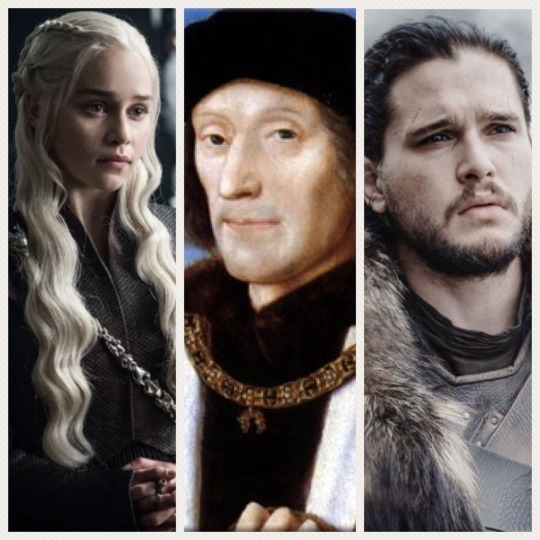
Jon Snow:
When Edward IV became the first Yorkist King in 1461, Jasper fled abroad and Castle Pembroke, along with the Earldom were given over to the Yorkist, William Herbert -who then took over guardianship of the 4 year old Henry and his mother. Henry lived in the Herbert household until 1469 (he was 12) when more York/Lancaster drama ensued and Henry VI reclaimed his throne.
Daenerys Targaryen:
At some point, fearing her son’s safety, Margaret sent Henry into exile with his uncle Jasper -where he remained, garnering French and Welsh support before returning to lay a claim to the throne. When Henry Tudor invaded England, his army consisted of French mercenaries and Welsh warriors – which would be considered a largely foreign group (foreign invaders -Dothraki and the Unsullied).
So, you see how in comparison to Henry’s early life, we could easily divide aspects of it between both Jon and Dany. Being raised by an uncle, being exiled for safety, garnering foreign support and returning to claim their “birthright”. It’s also important to note that with his father dying prior to his birth, Henry fought claims of illegitimacy (bastard) for most of his life.
A Dragon and a Prophecy
Henry also made some political capital out of his Welsh ancestry, attracting military support and safeguarding his army’s passage through Wales on his way to the Battle of Bosworth. He came from an old, established Anglesey family that claimed descent from Cadwaladr (a Welsh King depicted in legend, the last ancient British king), and on occasion Henry displayed that Welsh standard.
That Welsh standard Henry fought and conquered under? Well I’m glad you asked … The flag of Wales (Welsh: Baner Cymru or Y Ddraig Goch, meaning the red dragon) .
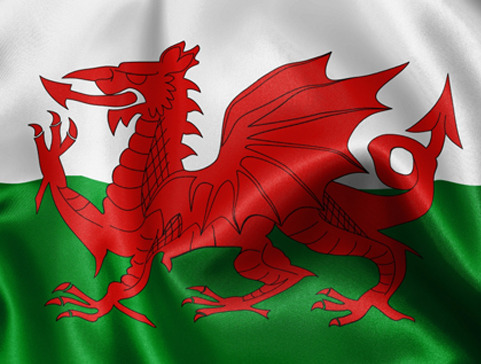
A red dragon! You don’t say? Where have we seen that before? Oh, right …the Targaryen house sigil.
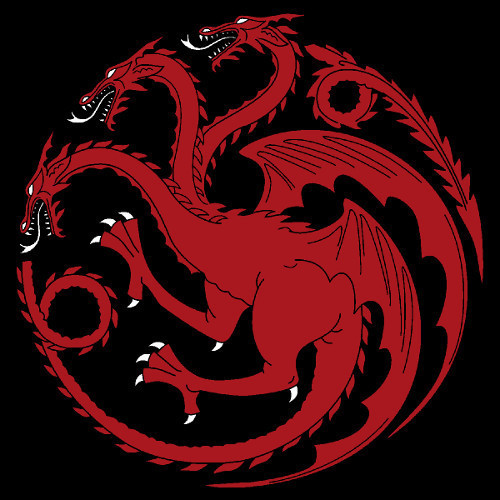
But Henry’s welsh dragon isn’t just ANY dragon, but -a dragon that’s attached to a prophecy: Y Mab Darogan.
From Wikipedia (again because I’m lazy):
Y Mab Darogan (pronounced [ə mɑːb darɔˈɡan] meaning “The Destined/Prophesised Son” or “Son of Destiny”) is a messianic figure of Welsh legend, destined to force the English out of Britain and reclaim it for its Celtic inhabitants. A number of figures have been called Y Mab Darogan in history (other titles include Y Gŵr Darogan and Y Daroganwr). An extensive corpus of medieval Welsh prophetic verse, beginning with Armes Prydain (10th century?), is centred on the figure of Y Mab Darogan.
A prince who was promised? Ya don’t say?!?!
Several historical figures have thought to have been this “Son of Destiny” -even King Arthur of Camelot. With poets and supporters labeling Henry the prophesied prince, it certainly didn’t hurt in strengthening his claim to the throne. Later, his reign over England was believed to be the prophecy fulfilled -a belief that he encouraged by naming his firstborn son Arthur.
Two Roses become One
As most of you know, Henry later wed Elizabeth of York. They were third cousins -both great-great grandchildren of John of Gaunt. The marriage unified the two warring houses and gave any of their future children strong claims to the throne. The unification of the houses of York and Lancaster by this marriage is symbolised by the Tudor Rose -a combination of the white rose of York and the red rose of Lancaster.
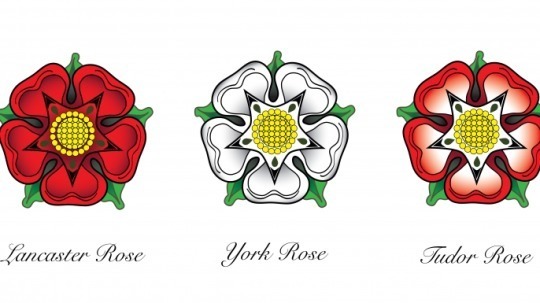
*Remember this, because we’ll come back to this later when I make my endgame predictions.
I would also like to present to you, the Tudor house Coat of Arms (under Henry VII and the first half of his son, Henry VIII’s reign):
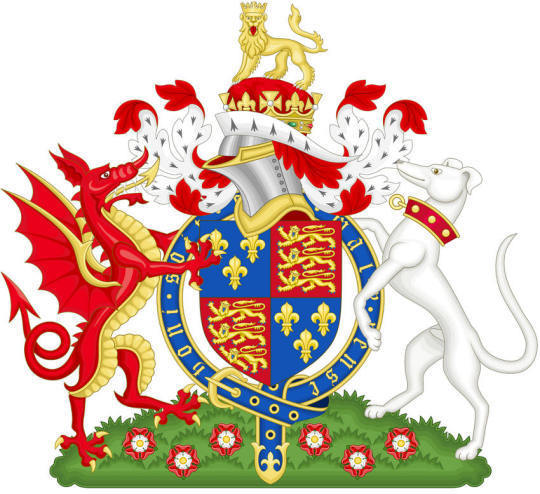
A red dragon, a white dog (wolf) and a golden lion sitting atop the crest, amid the Tudor roses.
As Alice (in Wonderland) would say: Curiouser and curiouser ….
The White Rose (of Winterfell?)
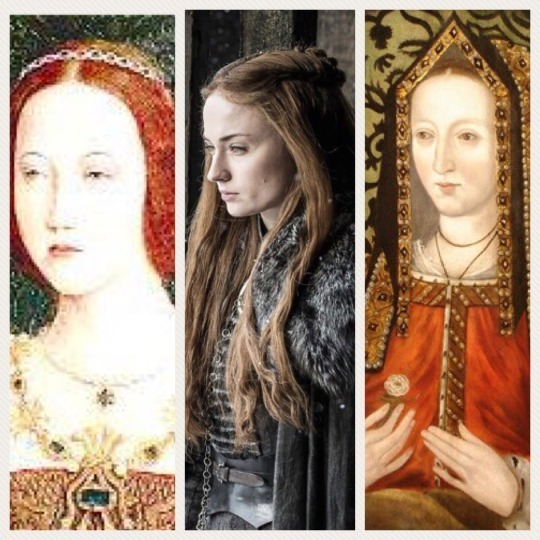
A red-headed beauty -Elizabeth of York was described as fair of hair and face. The eldest child, she had two younger brothers (known as the Princes in the Tower) who disappeared shortly after her father’s death -thought to be murdered by her uncle.
From Wikipedia (and you guessed it, because I’m lazy):
“The Princes in the Tower” is an expression frequently used to refer to Edward V, King of England and Richard of Shrewsbury, Duke of York. The two brothers were the only sons of Edward IV of England and Elizabeth Woodville surviving at the time of their father’s death in 1483. When they were 12 and 9 years old, respectively, they were lodged in the Tower of London by the man appointed to look after them, their uncle, the Lord Protector: Richard, Duke of Gloucester. This was supposedly in preparation for Edward’s forthcoming coronation as king. However, Richard took the throne for himself and the boys disappeared.
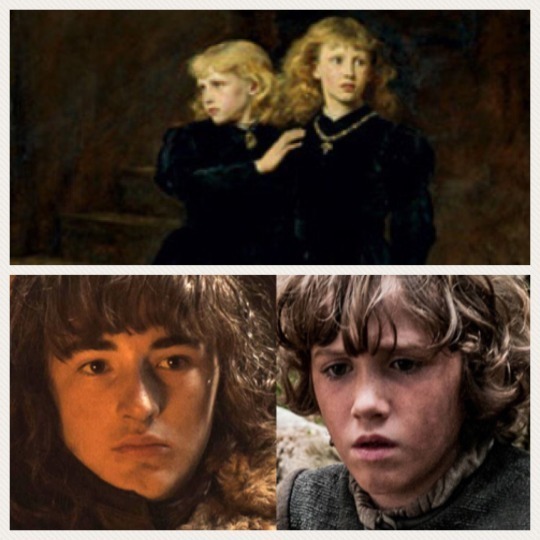
Compare this if you’d like, to Sansa’s brothers Bran and Rickon “disappearing” -first thought to be murdered by Theon, then Rickon actually being murdered, and Bran essentially dying as well, now that he’s the 3 eyed Raven. This may be a bit tin foilish, but Bran was also pushed from a Tower -which sent the whole chain of events in motion.
Despite being a political arrangement at first, the marriage between Henry and Elizabeth proved successful and both partners appear to have grown to love each other. Jon and Sansa have already proven to share a powerful loving bond rooted in trust.
But wait!
Aren’t the Starks (Yorks) supposed to be the good guys, and the Lannisters (Lancasters) the bad? I’m glad you asked, and I’ll hand you over to @thewesterwoman for that …
When it comes to the Wars of the Roses, one side - the Lancasters - has traditionally been presented in a far more positive light than the other - the Yorks. This is because the Tudor dynasty which ultimately emerged the victor of the war was descended in the male line from the Lancasters, making them the ‘winning’ side. As such, the vast majority of primary sources from after the war paint the Lancasters in a flattering light and the Yorks in a negative one, in an effort on the part of their writers to gain favor with the current reigning monarchs of England.
Today, this is especially noticeable in Shakespeare’s ‘history plays,’ several of which - Henry IV Part One, Henry IV Part Two, Henry IV Part Three, and Richard III - deal directly with the historical events of the Wars of the Roses. Shakespeare was writing during the reign of Elizabeth Tudor, and had an obvious motive for depicting her forebears as the heroes of the story that ultimately led to her rule. This is especially notable in Richard III, where the evil schemes of Richard of York lead England into chaos until the heroic Henry Tudor (a Lancastrian, and Elizabeth’s direct ancestor) finally emerges to defeat him and save the realm.
GRRM seems to have taken his fictional noble houses Stark and Lannister from the real-world Yorks and Lancasters, and they retain vestiges of the stereotypes of their historical counterparts. House Stark is strongly associated with tradtionally ‘evil’ motifs: ice, winter, death, and wolves (connoting the Big Bad Wolf of many fairytales). House Lannister, in contrast, has many ‘heroic’ connotations: warmth, sunlight, gold, and lions (which incidentally are on the royal coat of arms of England). From a distance, the Lannisters - with their wealth, beauty, and natural charisma - would seem like a natural fit for the protagonists of any story, while the Starks - known for their grim and gloomy dispositions and ominous House words - would seem like more natural antagonists.
But this is of course not the case. GRRM has both reversed the traditional historical narrative of the good Lancasters versus the evil Yorks, and the traditional motifs that we associate with good versus bad characters. In ASOIAF, the Starks are the heroes and the Lannisters are the villains, despite their respective surface appearances. This is both very interesting and very typical of GRRM, who loves to invert our expectations of fantasy narratives.
And now it’s time to put your tin foil hats on, because it’s endgame prediction time ….
So what does this all mean?
So if Jon and Dany are actually the two facets of Henry’s life prior to the crown -the exiled conqueror (Dany) and the “bastard” prince (Jon) raised by a Yorkist (Stark) -also his uncle, where does that leave Dany? Well, I’m pretty sure Dany will meet her death on the other side of the wall.
Let us return to Dany’s time spent in the House of the Undying -to simplify, we’ll use the show version. We’ll come back to her time in the throne room later, but first -remember when she stepped through what looked curiously like the gates to the other side of the wall -into the wintery beyond?
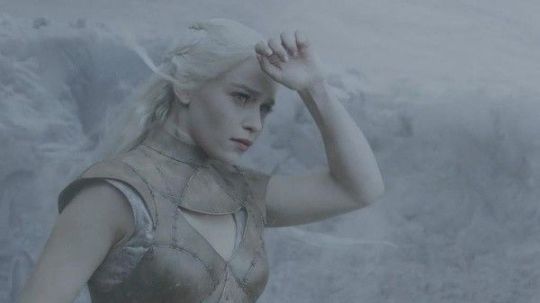
Here, she was reunited with her true love and husband, Khal Drogo and their son, Rhaego.
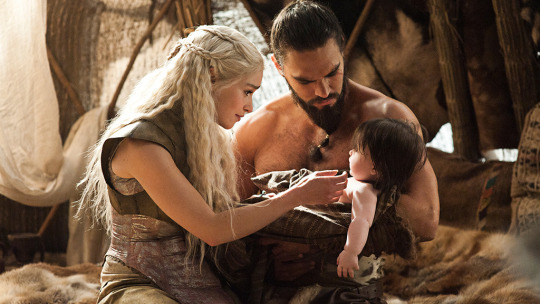
Here, she was reunited with her true love and husband, Khal Drogo and their son, Rhaego.
Perhaps this was a foreshadowing of sorts, that she will die in battle beyond the wall during the Long Night, and in death, be reunited with her son and husband -who wait for her in some form of purgatory, so they can all ride together into the Night Lands?
Drawing from the Henry Dany/Jon parallels, and if you’d like to get real tinfoil-y, we could look at Targcest as a way of melding these two halves of Henry into one. Maybe Dany perishes before the showdown with Cersei -leaving that war for Jon to be the parallel to Henry’s Battle of Bosworth -the battle that won him the crown by conquest -as to which he strengthened by then marrying Elizabeth of York.
*I’d like to make that very clear. He didn’t use his new wife to seal the deal, he used conquest (in defeating his rival) -he strengthened his throne (and future line of succession) in marrying EoY.
Returning back to Dany’s visions in The House of the Undying, she enters the throne room and it looks destroyed -although the throne still remains intact. Some people think it was ash falling through the broken ceiling -others snow. I’m going with the latter. Here’s why:
Dany approaches the throne, but does not touch it -instead she walks out the door which led her to the other side of the wall (to her family). She’s come to Westeros, but she will never be the queen. Instead, Jon will be the reluctant King -again thrust into a position of leadership that he doesn’t necessarily want, but will accept for the good of all. He will not be a King who conquered, but instead a King that was chosen.
Since Jon is both a Stark and a Targaryen, but his Targaryen lineage is what gives him a right to the Iron Throne -ironically, a Targaryen will once again rule Westeros. With Dany’s death, so dies the old House Targaryen that she represents, with Jon being the start of a new (and as @thewesterwoman points out -less incestuous) dynasty. This would again mirror the fate of House Plantagenet.
But will he rule as a Targaryen? Or a Stark? Maybe neither?
Perhaps he will rule as a Snow -which considering the connotations, and how being a bastard plagued him his entire life, it would certainly be rather poetic. The Snow falling in the throne room could be a foreshadowing of this. The Targaryen structure is destroyed, but the throne that Targaryen and Lannisters have sat on, is intact.
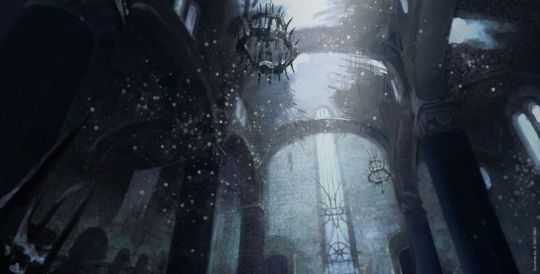
And remember this? The blending of the Lancaster and York roses into the Tudor rose?
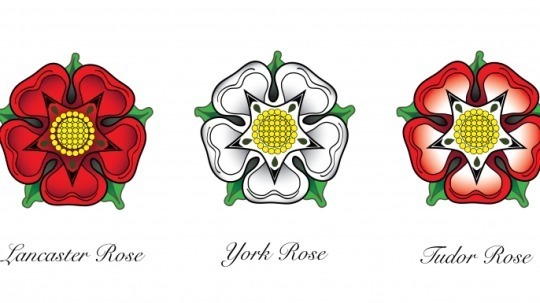
This also leads me to believe that Jon might start a new house entirely, and create his own house sigil -combining the Targaryen and Starks somehow, but allowing BOTH original houses to die off -much like both the Lancasters and Yorks, with no male heirs left to carry on the names. In the books, snow is a big theme in a lot of Sansa’s arc -especially the time she spends as Alayne in the Vale. Many have already drawn these parallels to Jon.
There Must Always be a Stark in Winterfell
(Inspired by the ask I sent thewesterwoman)
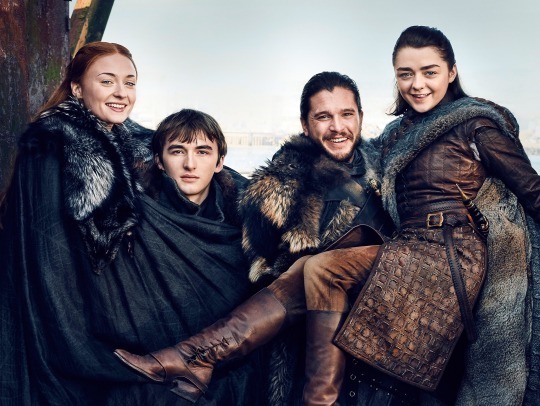
Bran has made it pretty clear that he is NOT the Lord of Winterfell. Bran technically isn’t even Bran anymore. *Think of Elizabeth of Yorks two brothers (the princes in the tower). If Arya marries, she will take her husband’s name -same with Sansa. So, if Jon doesn’t take the Stark name, the Stark name perishes, too.
Consider if you will, that Winterfell falls in the Long Night. It was built by Brandon Stark (aka: Bran the builder), one of the “First Men”, as well as the founder of House Stark. He also is said to have built the Wall -“raised it with the aid of Giants”, according to legend. Ironically, the Night King is known to be one of the First Men, too. Supposedly, Bran Stark is in the Winterfell crypts, although some have speculated that he’s actually the NK.
What if there’s something “magical” behind Winterfell and it’s crypts? When Bran asked undead Benjen to come with them to the other side of the wall, he said he couldn’t, as there was magic carved into the foundation of the Wall, and as long as it stood, he could not pass. Maybe there’s something magical connected to Winterfell and the phrase “there must always be a Stark in Winterfell” and, that it’s all somehow connected to the Night King.
If the Night King is defeated once and for all, and Winterfell falls, there’s no longer a “need” for a Stark to be there -giving credence to the theory of Jon starting a new house entirely.
With the Starks being the “good guys” and the story mostly framed around them, Jon and Sansa as Ned/Cat 2.0 yet, the end of House Stark sounds pretty bittersweet to me.
Of course, this is all just speculation …
War of the Roses was only one of many things that GRRM drew inspiration from.
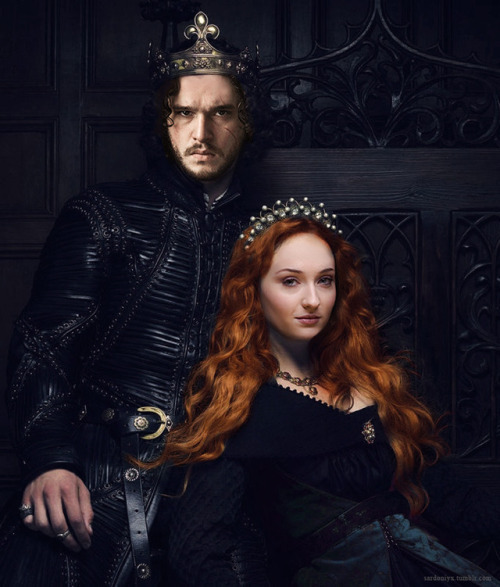
*credit to @sardoniyx for this AMAZING manip work!*
#got meta#wars of the roses#jonsa meta#got predictions#got speculation#jonsa is endgame#wars of the roses parallels#asoiaf#asoiaf meta#jonsa#jon x sansa
1K notes
·
View notes